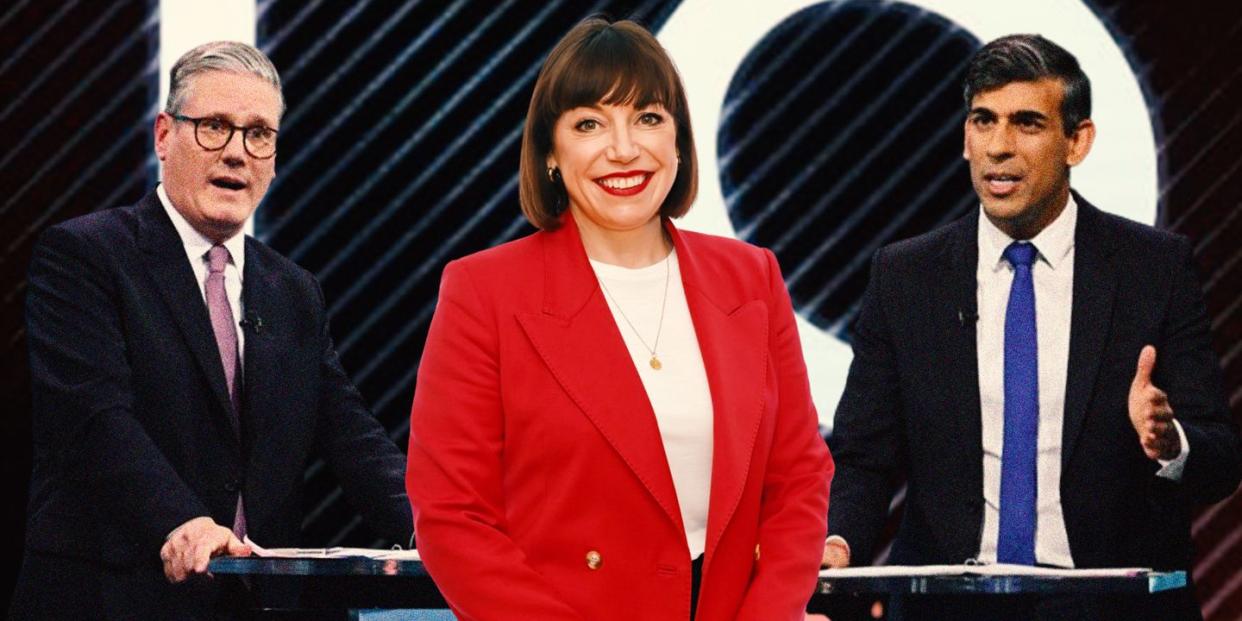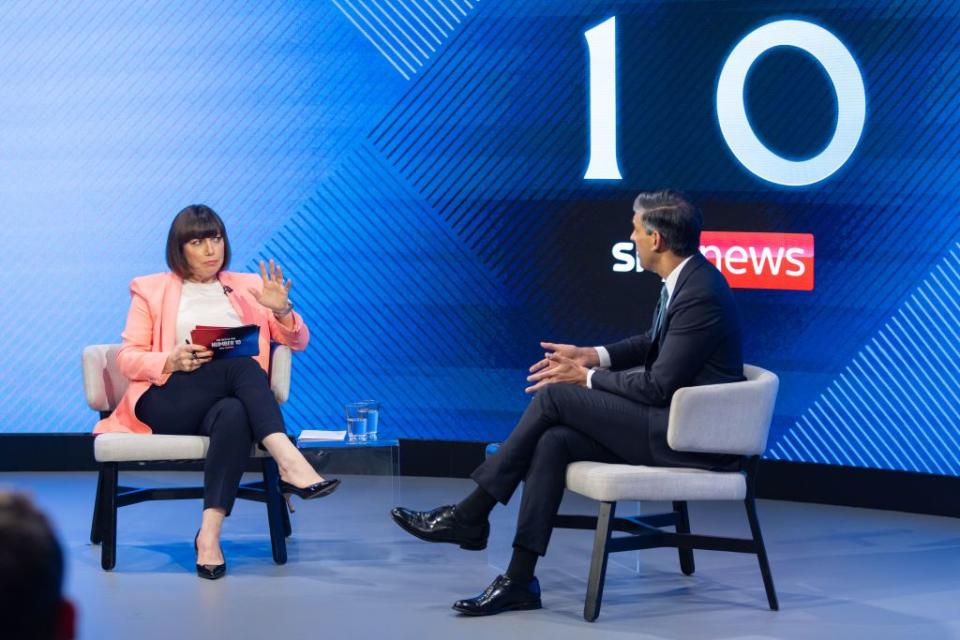‘It may be mostly men on the ballot – but it’s women who are shaping the election’

It’s 2010 and my first general election working in Westminster. I’m an intern for a small business lobby group, devouring all the news I possibly can about the parties and what they stand for, so excited to feel part of the action even though I was little more than a glorified note-taker at the time. That year was also the first time TV debates (an idea adopted from America) hit British screens – and they were hugely successful, drawing in over 10.3m viewers (Downtown Abbey, the most popular drama at the time, had an audience of 10.7m). No mean feat.
Back then, three TV debates were hosted on BBC, ITV and Sky News, featuring three men: Gordon Brown for Labour, David Cameron for the Conservatives and Nick Clegg for Liberal Democrats. And then, three more men: Alastair Stewart, David Dimbleby and Adam Boulton, chaired the proceedings. Fast forward to 2024, and I’m no longer an intern and have had a 15 year career in the political sphere, now leading on communications for a government department. In my circle at least, I've seen a rise in women adopting senior positions – yet sadly the can't be same across the wider political board. But a cultural shift is happening.
This general election, debates are an established part of the political furniture and feature three female chairs: Beth Rigby, Mishal Husain and Julie Etchingham. Perhaps as we’re so used to women anchoring popular shows, from Love Island to Chicken Shop Date, this might not seem a big deal, but for political programming, it's huge. Even if there is a dearth of female politicians on hand to answer their questions. Back in 2010, having three women shape the most watched election shows in the country would seem laughable. But it's a vital change.
At the Sky debate in Grimsby, Beth Rigby (or Beth Rig-Beer– nothing says ‘shaping the cultural zeitgeist’ than having your own northern beer named after you) used my favourite political interview style; ‘woman who has basically had enough’. The biggest clap of the night, always the best audience metric, besides laughter, came when she asked Rishi Sunak ‘Isn’t it the truth that your problem is broken promises?’ – a question women have been asking in different contexts since the dawn of time.

A video posted by a single account on X also spotlit the very human question that Rigby asked Keir Starmer – ‘what are you most afraid of?’ – and has been watched nearly a million times. The majority of these type of questions, designed to get to the heart of who a politician is, are asked by female journalists. Remember Theresa May’s infamous ‘running through a field of wheat’ response in one interview (that spawned a thousand memes), when asked about the naughtiest thing she’d ever done? The interviewer was Julie Etchingham – this year’s ITV debate host – again showing how female journalists don’t just ask the obvious questions or fixate on specific issues, but instead know that we want to vote for the person. Which includes all their flaws and the personal lives that have shaped them.
There are still many women who haven’t decided who to vote for and we’ve three weeks of campaigning to go; meaning journalists like this, who gain true insights into the personalities of the leaders and senior party reps, are critical. But it’s far from the only game in town when it comes to reporting.
Many UK newspapers still have a majority male editorial team and as a result, struggle to properly cover some of the female-interest campaigns, such as VAT on tampons. You might think newspapers aren’t relevant anymore, given only 16% of Gen Z get their news from print, but they still impact political campaigns and their leaders. When PM, Boris Johnson famously started his daily team meeting with a review of the papers, so what and how they report does matter to policy and getting issues, such as violence against women and girls, onto their agenda.
Which brings me to the politicians themselves; going into the 2024 election, only one of our major political parties has a female leader, the Green Party with Carla Denyer, and she is a co-leader with Adrian Ramsey. And although Labour, Lib Dems, SNP and Conservatives have put up female politicians to represent them at the main debates and Labour and Lib Dems have female deputies (Angela Rayner and Daisy Cooper), the visibility and influence of female politicians on this election has been pretty bad, and much lower than the female broadcast titans – only highlighting the disparity. I totted up the numbers for Cosmopolitan and in the 17 weekdays since the election was called, during the ‘morning media round’ where politicians from Labour and Tory are interviewed across a range of channels to set up the day’s news, Labour have fielded only three women, and the Tories four.
This matters in two ways. Women talk to women using life experiences that other women understand. When Amber Rudd – then a top Conservative ‘remain’ politician - said on a Brexit debate that Boris Johnson was ‘the life and soul of the party but you wouldn’t want him driving you home afterwards’, I knew exactly what kind of man she meant. I expect you do too, and definitely don’t fancy him as Prime Minister. But it isn’t just about communication; having women in positions of power improves decision making. At the Covid Inquiry, a senior female civil servant said the lack of women at the top meant that issues such as pregnancy, access to abortion and domestic abuse were not properly considered during the pandemic.
With 23% of women still undecided about who to vote for, and the majority feeling that the campaigns aren’t speaking to them – there’s an enormous opportunity for the parties to start putting their senior female politicians on broadcast to talk to female voters directly. And there are loads of great women for the parties to choose from to give us their perspectives too, albeit representation is still 34% vs 66%.
So, if you want to see and hear more women in parliament, campaigning and talking about how they can improve your life if they get into office, register to vote today and start demanding our issues are at the top of the agenda.
Today is your final chance to register to vote: click here to sign up!
Abigail Morris is a former Director of Communications for the Dept for Science and Tech, you can follow her on X
You Might Also Like


